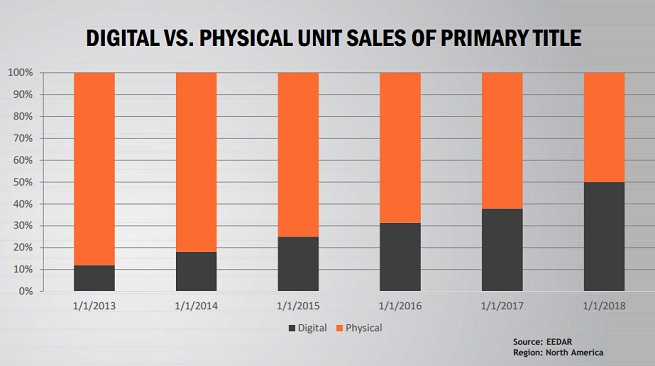By 2018, about 50 percent of console game sales will be sold via digital downloads, according to a forecast by market research firm EEDAR. And that will have a lot of consequences for how they are marketed in the future, said Greg Short, chairman of EEDAR, in an interview with GamesBeat.
In 2014, the digital share of console game sales is less than 20 percent. But downloads are growing much faster than physical store sales. That means marketers will have to change how they promote to keep pace with where the gamers are engaging with the products, Short said.
“The question becomes how relevant will traditional marketing be in the long term,” said Short. “And how will advances in advertising, like programmatic ads, change the game? Marketing is becoming more of a data-driven game.”
Short will make his forecast on the changing landscape of marketing at the Game Marketing Summit on Wednesday in San Francisco. The whole conference will be about how marketing professionals have to adapt to world full of social, mobile, and online games in addition to the traditional consoles. Short will moderate a session with marketing executives from Sony PlayStation, Microsoft Xbox, and publisher Ubisoft.
The demographics for games are changing as social, mobile, and online games continue to grow, and console products absorb the features of those new platforms.
“We have a new generation of hardware, and we’ll look at how that is changing marketing, too,” said Short. Most games are now launching with microtransaction digital content on the first day that the games are available on the consoles.
“Emerging business models are changing the way marketing is done,” said Short. “It used to be a three-month campaign and then you are done. Now it is all about targeting ads, retention, and lifetime value of a customer.”
One of the big roadblocks for console game companies is that the cost of marketing blockbusters has risen dramatically. There are a handful of billion-dollar franchises such as Call of Duty and Assassin’s Creed that command so much attention every year that they drown out competitors.
“It’s getting too expensive, so we are seeing fewer games and they have to be bigger,” Short said.
VentureBeat's mission is to be a digital town square for technical decision-makers to gain knowledge about transformative enterprise technology and transact. Learn More



